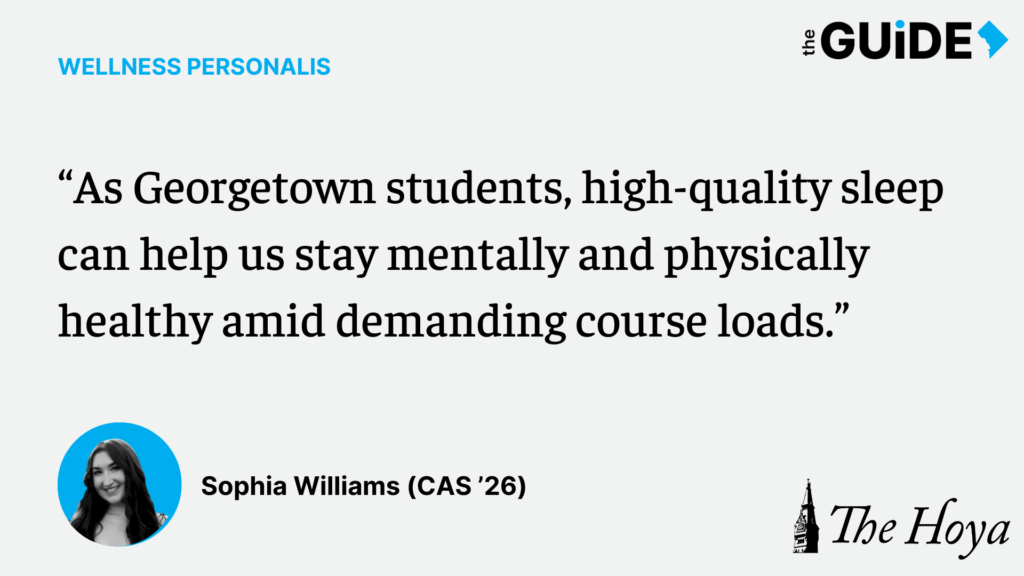Welcome back to campus, Hoyas! For this installment of Wellness Personalis, I’m exploring sleep: what it is, how to customize it to your lifestyle, and its impact on wellness.
When I think about sleep, I think of the timeless distinction between “night owls” and “early birds,” formally known as sleep chronotypes. I’ve always considered myself a night owl, but on my flight home for winter break, I dug a little deeper when I had the opportunity to watch a MasterClass called “The Science of Better Sleep” by Matthew Walker, a professor of neuroscience and psychology at the University of California, Berkeley.
Walker discussed how to sleep “better” by understanding your personal sleep needs and what sleep can do for you, both in the long term and short term. Whether you have a New Year’s resolution to improve your sleep schedule or are just curious about the truth behind sleep, you’re in luck. I have pinpointed what I hope are some interesting facts for you.
First things first, let’s define sleep. There are two types: non-rapid eye movement (non-REM) and rapid eye movement (REM). Humans cycle between these two types all night, forming a cycle we call “sleep.”
Walker says non-REM sleep transfers the short-term knowledge we learn daily to long-term memory storage. In terms of wellness, non-REM sleep strengthens the immune system and prepares our bodies to fight immune issues more effectively.
REM sleep, on the other hand, allows us to process emotionally challenging events and find the answers to our problems. Though this may sound strange, REM sleep makes connections between new information and information that already exists in our minds. Both parts of sleep contribute to our overall wellness, confirming that to be well is to sleep well.
Walker reveals that your inclinations as a “night owl” or an “early bird” are genetic. He also says that your determination can help you personalize your sleep schedule. To find out which “bird” I am, I took an online quiz called “The Automated Morningness-Eveningness Questionnaire,” or AutoMEQ — one of the many available online.
My results didn’t offer me a satisfying answer: I ended up between the types. Still, the AutoMEQ gave me an approximate bedtime that I can use to build a healthy sleep schedule. Walker recommends sticking to the same daily sleep routine to keep your circadian rhythm, the twenty-four hour cycle that aligns our wakefulness with day (light) and our sleep with night (darkness), balanced.
Walker says the average adult requires between 7-9 hours of sleep a night, but some people may require more or less. Meeting these requirements can be difficult with early classes — sometimes “night owls” have to follow an “early bird” schedule. However, prioritizing the quality of your sleep by reorganizing your schedule around the preferences of your sleep chronotype can help you improve your overall wellness.
Other factors also play a role in the quality of one’s sleep. Walker explains that melatonin manages the sleep-wake cycle of the circadian rhythm by inducing tiredness in the human body with the onset of darkness, indicating to the human body that, when night falls, it is time to rest. In light of this, I would recommend investing in a sleep mask — especially if you and your roommate have different bedtimes. You can also help prevent false light from disrupting your circadian rhythm by avoiding light from electronics before bed and following a bedtime routine.
An especially important aspect of sleep for Georgetown students is its direct link to the immune system. According to a study by Dr. Cohen, individuals who report sleeping less than seven hours per night are almost three times more likely to contract the common cold. Sleep can naturally protect our bodies from the illnesses that constantly plague this campus by recharging the immune system and creating more immune factors like killer T cells, which combat disease by killing foreign cells and cells infected by viruses.
As Georgetown students, high-quality sleep can help us stay mentally and physically healthy amid demanding course loads. As we welcome the new year and a new semester, it’s the perfect time to personalize and enhance your sleep routine. Sweet dreams, Hoyas!
Sophia Williams is a freshman in the College. Wellness Personalis will appear online and in print every other week.














